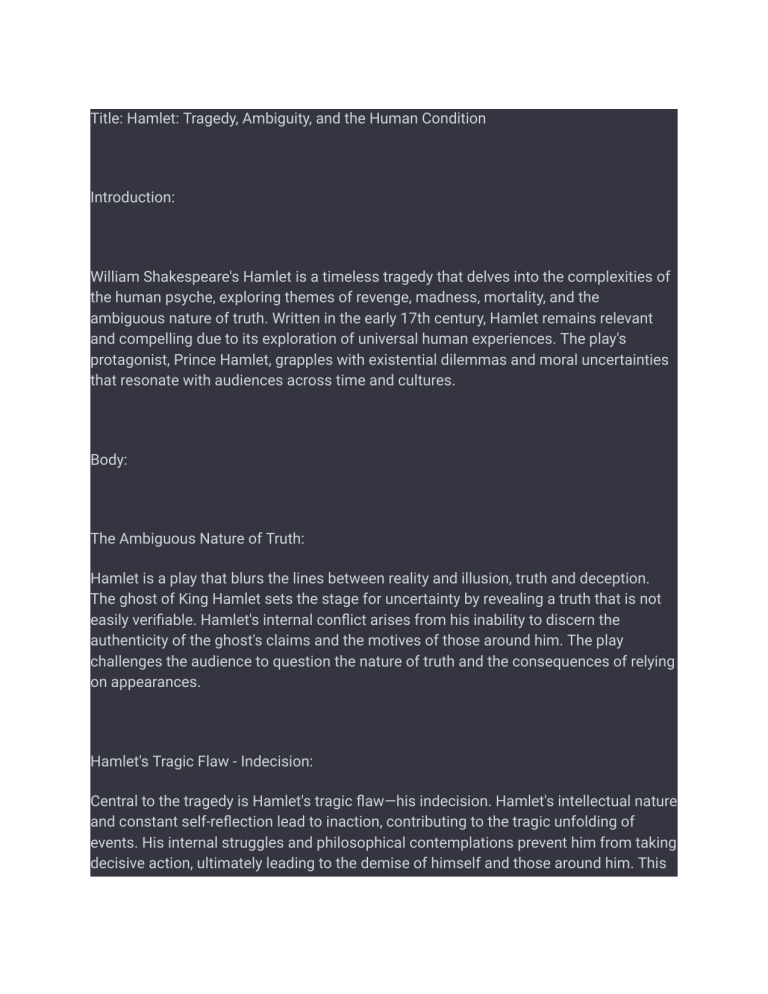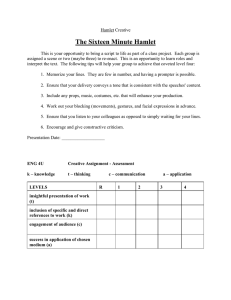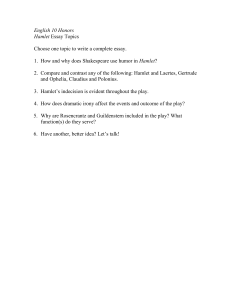
Title: Hamlet: Tragedy, Ambiguity, and the Human Condition Introduction: William Shakespeare's Hamlet is a timeless tragedy that delves into the complexities of the human psyche, exploring themes of revenge, madness, mortality, and the ambiguous nature of truth. Written in the early 17th century, Hamlet remains relevant and compelling due to its exploration of universal human experiences. The play's protagonist, Prince Hamlet, grapples with existential dilemmas and moral uncertainties that resonate with audiences across time and cultures. Body: The Ambiguous Nature of Truth: Hamlet is a play that blurs the lines between reality and illusion, truth and deception. The ghost of King Hamlet sets the stage for uncertainty by revealing a truth that is not easily verifiable. Hamlet's internal conflict arises from his inability to discern the authenticity of the ghost's claims and the motives of those around him. The play challenges the audience to question the nature of truth and the consequences of relying on appearances. Hamlet's Tragic Flaw - Indecision: Central to the tragedy is Hamlet's tragic flaw—his indecision. Hamlet's intellectual nature and constant self-reflection lead to inaction, contributing to the tragic unfolding of events. His internal struggles and philosophical contemplations prevent him from taking decisive action, ultimately leading to the demise of himself and those around him. This indecision highlights the human condition's vulnerability to the complexities of moral choices. Revenge and its Consequences: Revenge is a recurring motif in Hamlet, and the consequences of pursuing it drive the narrative. Hamlet's quest for vengeance against Claudius, his uncle and the new king, results in a chain of tragic events. The play explores the destructive nature of revenge and the toll it takes on the avenger, blurring the line between justice and personal vendettas. Madness as a Coping Mechanism: Hamlet's feigned madness becomes a coping mechanism in response to the chaos surrounding him. This psychological aspect of the play raises questions about the thin line between sanity and madness. Hamlet's internal turmoil and the external pressures he faces contribute to his descent into madness, serving as a commentary on the fragility of the human mind under duress. Existential Themes: Hamlet grapples with existential themes, questioning the purpose of life, the inevitability of death, and the moral complexities that shape human existence. The famous soliloquy "To be, or not to be" encapsulates Hamlet's existential contemplations and invites the audience to reflect on their own mortality and the meaning of life. Conclusion: In Hamlet, Shakespeare masterfully explores the depths of the human experience, delving into the complexities of truth, morality, and the consequences of inaction. The play's enduring relevance lies in its ability to resonate with audiences through its exploration of universal themes and the timeless portrayal of the human condition. Hamlet, with its rich characters and profound insights, continues to captivate and challenge audiences, inviting them to reflect on the intricate tapestry of life and the choices that define our existence.



